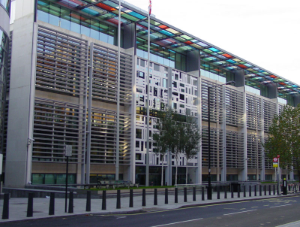Government issues statement after Tribunal awards Raytheon damages following the termination of e-Borders contract
An arbitration tribunal has ordered the Home Office to pay £224 million to Raytheon Systems Ltd over the failed e-Borders programme.
In 2007, Raytheon won a nine-year contract to deliver the programme. The contract was worth around £750 million in total, but it was terminated by the Government in 2010.
According to BBC News, the Home Office and Raytheon entered into binding arbitration to reach a settlement after Raytheon threatened to sue.
 Image credit: UK GovernmentIn a statement released today, Home Secretary Theresa May said the Tribunal awarded Raytheon £49,980,807 for damages and £9,600,851 for disputed contract change notices.
Image credit: UK GovernmentIn a statement released today, Home Secretary Theresa May said the Tribunal awarded Raytheon £49,980,807 for damages and £9,600,851 for disputed contract change notices.
In addition, £126,013,801 was awarded for the assets delivered between 2007 and 2010, and approximately £38 million was awarded in interest.
May said that despite today's award of damages, the Government stands by the decision to end the e-Borders contract with Raytheon.
"This decision was, and remains, the most appropriate action to address the well-documented issues with the delivery and management of the programme … Key milestones had been missed and parts of the programme were running at least a year late. Raytheon Systems Ltd had been in breach of contract since 2009. Prolonged negotiations had taken place under the previous Government which had led nowhere, " she said.
However, she said that the Tribunal had raised concerns about how the Raytheon contract was managed by the UK Border Agency and the processes involved in deciding to terminate and how it was carried out. As a result, the Home Office has asked the National Audit Office to conduct a full review of e-Borders from its inception.
Giving further details of the programme's aims, May added: "The original e-Borders requirement – to record Advanced Passenger Information for checking against terrorist and crime watchlists – is being delivered. The estimated proportion of passengers who travel to and from the UK, for whom we collect Advance Passenger Information on routes connected to Semaphore, is currently just over 80% – up considerably from just over 60% at the end of 2009. This is the highest for any European country according to the European Commission, and is amongst the best in the world."
"Advance Passenger Information is a priority for border control and security, and already covers 95% of commercial air routes with the UK. The Home Office continues to drive that up, strengthening coverage in the maritime and rail sectors alongside air routes, including through new powers in the Immigration Act this year."
In March of this year, Labour MP Keith Vaz, chairman of the Commons Home Affairs Committee, told BBC News: "The e-Borders project has ended in a shambles."
"This debacle has cost the taxpayer hundreds of millions of pounds, taken more than a decade and yet we still do not know if the original objectives will ever be achieved."
He added: "Promises have been made that exit checks will be in place by the general election, but given past failures the government need to urgently clarify the timetable for the completion of the rest of the programme and what components of the original e-borders programme have been dropped."